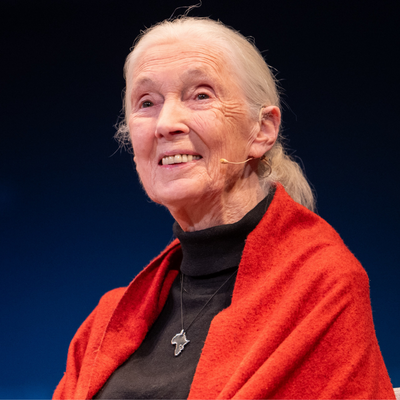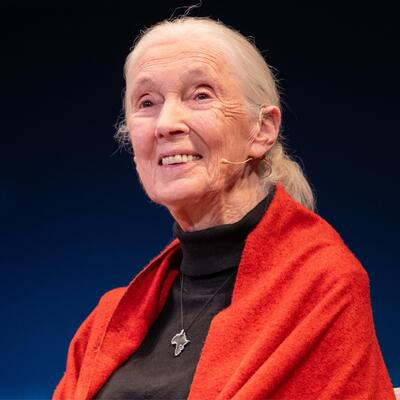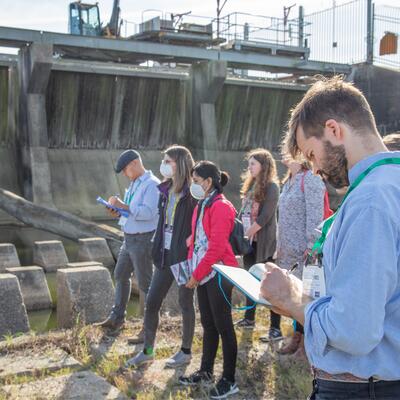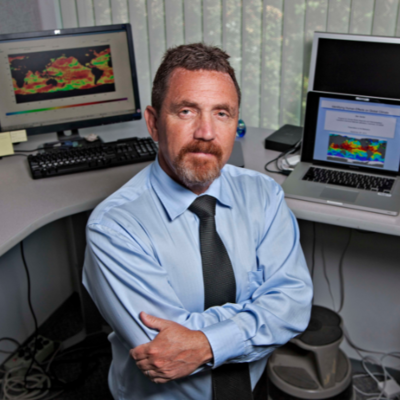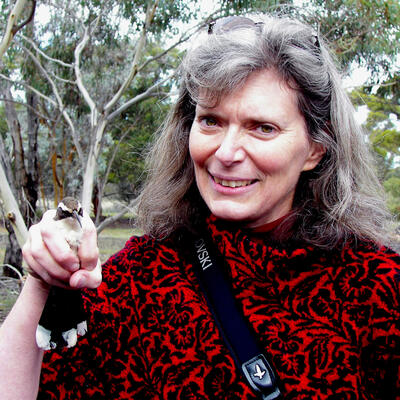
My Climate Story: Terry Root
Guests
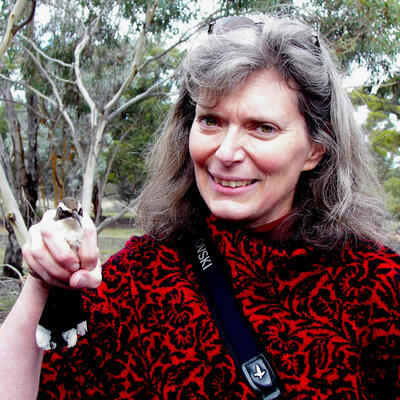
Terry Root
Summary
This special episode is part of the My Climate Story series, published in partnership with Covering Climate Now, a global collaboration of more than 250 news outlets to strengthen coverage of the climate story.
Scientist Terry Root’s research has helped reveal how climate change puts bird and animal species at risk for extinction. For Root, the climate connection is also personal: she was married to the late Steve Schneider, a Stanford professor and pioneer in communicating the impacts of climate change, who died suddenly in 2010.
“It's been a fabulous career, but it has been very painful at times, very painful,” says Root, who was the lead author of the Intergovernmental Panel for Climate Change Fourth Assessment Report in 2007 when it was co-awarded the Nobel Peace Prize with Vice President Al Gore.
Resources From This Episode (2)
Full Transcript
Greg Dalton: This is Climate One, changing the conversation about energy, the economy, and the environment. I’m Greg Dalton.
Behind the facts and figures that shape the climate narrative are scientists and others who pay a severe personal price for bringing that information to light.
Terry Root: I just cried and say how sorry I was that I had caused her son Tim to be in prison.
Greg Dalton: Terry Root is a former senior fellow at the Woods Institute for the Environment at Stanford University. Her research has helped reveal how climate disruption increases the risk of extinction for birds and animals. She was married to the late Steve Schneider, a Stanford professor and pioneer in communicating many dimensions of climate change. He died suddenly in 2010 on the way home from a conference. She also prompted activist Tim DeChristopher to stand up against fossil fuels — a move that landed him in jail.
This short pod is part of a series we are doing for Covering Climate Now, a global collaboration of more than 250 news outlets to strengthen coverage of causes and solutions.
Greg Track: We begin Terry Root’s story on July 10th 2010, the last time she saw her husband Steve before he flew to Europe.
Terry Root: He was so, so excited because he was starting into a whole new realm of climate change. He was going to be working on the sociology of climate change. And scientists so often think all we have to do is get the numbers out there and people will believe us and the sociologists keep telling us that’s not true. And he had decided that that was indeed not true and he had to do something about it. So he went to this meeting to give not one not two but three keynote addresses and he never came home to me.
Greg Dalton: And where were you when you learned that he, I think he died on a plane back from Europe to San Francisco?
Terry Root: He was. After this big meeting he went to a workshop to really work with people trying to figure out what to do about the sociology of climate change. And then he flew from Sweden to London and it was only a 45-minute air flight and he died of a blood clot on the airplane. And so he was pronounced dead in the London airport and the deputy ambassador called me at 1:30 in the morning and said, your husband has died and I just said, I'm sorry this isn't a funny joke. I actually thought it was a joke. He had promised me that he wasn't gonna travel that much because he needed to get his health back in order and he was coming home and he wasn't gonna travel for six weeks. And when he left, I was mad at him for going because I didn't feel he should go. But it was so important to him that he really wanted to do something to try and get people to understand about climate change and he had to do it and it cost him his life. I am convinced of that and so were many other people.
Greg Dalton: He kind of gave his life to the cause. He also received lots of death threats. So the fact you thought it was a joke when someone said your husband died, you thought it was a prank or another death threat?
Terry Root: Yeah. I literally thought it was a different death threat. He had gotten many death threats. He worked at Stanford University like I did and Stanford University had a particular person in the Police Department that took care of things like this. And we knew him on a first name basis because Steve got so many death threats and I had gotten two different times in my life I have gotten several death threats too. But Steve got them all the time because he was always out trying to get people to understand how important climate change was.
Greg Dalton: And how do those death threats affect him, affect you in your daily life?
Terry Root: Well, the first time I heard that Steve was getting death threats. He came home he printed out an email and he came home and he read it to me at the dinner table that night and he was laughing and I was horrified. And he said, oh I get these all the time. I don't think anything of them. And I said this guy is telling you where you live. This guy is telling you what buildings you go to on Stanford campus. He knows who you are. How can you be laughing? And so I stopped dinner and literally called the police. This is before we actually had a relationship with this man, called the police and the police literally came to our house and talked about this. So these were people who really were serious. There are some that were just Looney Tunes but there were others that said, well I know that you went to Safeway on such and such a day, you know, they knew all of these things. I know that your license plate is such and such. That's very scary. It's very, very scary.
Greg Dalton: And as, you know, abortion clinics found out sometimes those things are those are acted upon. Did that affect his science or your science in any way; that’s obviously the intention is to chill the scientific discovery.
Terry Root: What it really did was it changed how we worked on the social media. We tried to get all of the information about where we lived and our telephone numbers and all of this off the social media which turned out to be impossible. Did it change the science, of course it did, it made us work really hard. It made us work harder. We were making a dent. People were getting upset. And something that Paul Ehrlich always would say was you can really tell you're making a dent when people start getting angry at you. And they certainly were getting angry.
Greg Dalton: Was there ever pushback from fossil fuel interests at Stanford or other universities that try to suppress your work?
Terry Root: That's a real tough one. There is a center at the University that is funded by Exxon and we were told, Steve was very, very influential in the center before it got the funding from Exxon. And when they got the funding from Exxon he was told, along with the other people who were involved with this that Exxon would be very, very good about staying out of the way of everything. And then they came up with the title for the center and that night, the head of the center got a call from Exxon, somebody in Exxon, telling them that they couldn't call it that that they had to call it something else. And it was at that point that Steve backed out. He said I won't have anything more to do with it. So the center is still there I don't know what's happening. But Steve wouldn't be involved with it anymore.
Greg Dalton: Yeah, that was I think a $100 million one of the first yeah mega gifts to a research university.
Terry Root: That's exactly right. It was the big huge gift, exactly.
Greg Dalton: After Steve passed away, how did that affect your work? Did it affect the work of other climate scientists? Because he was in many ways the tip of the spear, member of the founding father generation of modern climate scientists along with Jim Hansen and others. What kind of hole did his passing leave in the field?
Terry Root: It's huge. And I'm convinced that if he were still alive that we would be a lot farther along than we are right now. He had the ability to not just know the physics of climate not just know the mathematics behind the modeling, not just know the biology behind it, not just know the psychology and the sociology behind it. He put it all together in a way that the general public could understand.
And I wish I had a dollar for every time somebody came up to me in the next probably five years after he died, and said that we need 5 to 7 people to fill Steve’s shoes. And I truly, we've tried to do it. Michael Oppenheimer has picked up a huge piece, Ben Santer has picked up a huge piece there's a lot of people who have picked up pieces. But to have somebody who understands the whole shebang really makes a difference and it's been a huge loss. But I guess I could say I'm very biased, very biased too, but he could talk to someone who was a naysayer and respect them and actually get them to understand where their logic was illogical and get them to understand what was right.
Steve Schneider: Science is not about belief. Science is about evidence. And it is completely legitimate as everybody said to look over a long period of history. But you have to be very careful not to make an analogy by saying what happened in the past is caused by the same things that are happening now.
Terry Root: And I honestly believe that they really did understand what was happening and how humans were affecting the climate dramatically.
Greg Dalton: Yeah, experts I've interviewed say that empathy and listening is the key to kind of getting people to listen to you and persuade them rather than a lot of what we have these days is even on the climate side is dispersing facts and think that just logic alone will persuade people, facts alone. And I think Steve had that, as you noted, multidisciplinary insight into how people think and change their minds.
Terry Root: I think it was very, very important and there really isn't anybody there that's able to do that. Michael Oppenheimer does a good job but there's still a lacking, you know, I miss him horribly.
Greg Dalton: Yeah. Michael Oppenheimer is a professor at Princeton. You gave a talk I think it was in Utah and a man came up to you afterwards. Tell us that story of that talk and who came up to you afterwards.
Terry Root: This was a wonderful story. When I was a professor at the University of Michigan I taught a class called conservation biology. And one of my students ended up becoming a faculty member at the University of Utah and he invited me to come out and talk on climate change at this big huge meeting that they were having. And so I gave my talk on climate change. Now, even people in the IPCC would say you can't tell all the facts because they're so dire it's going to paralyze people. So when I would give talks I wouldn't pull punches, but oftentimes I wouldn't tell everything that I knew because I didn't want to stymie everybody and paralyze people to not be going to act. Anyway, Tim DeChristopher came up to me after my talk at a break and he was, he looked at me and he had tears in his eyes and he says, is it really as bad as you say it is? And I looked at him and I said, no I'm sorry to say it's actually worse.
Tim DiChristopher: So what am I missing here? And you said you’re not missing a thing. You said there were things we could’ve done in the 80s and things we could’ve done in the 90s but I really think its too late. You put your hand on my shoulder and you said, “I’m sorry my generation failed yours”.
Terry Root: And he said, tell me how it's worse. And so I went through and I talked about the sixth mass extinction and how we were accelerating that extinction and how did we as one species have the right to cause that extinction of that many species and how we didn't have much time left to make changes and we needed political will and things like this. Well, he told me later that he went out on the curb and just sat on the curb and cried and said that something had to happen. He had to do something to try and save the world from climate change and so he did.
He started a group and what he did was he learned that they were going to auction off oil reserves near Arches National Park I believe it was Arches National Park. And so we were gonna have oil wells right next to the National Park and he felt as though something have to change, you couldn't do this. And so he didn't know what to do so he actually joined the auction. He walked in, he put on a suit and he walked in as though he was going to go in and be a buyer of these mineral rights, and so he was given a paddle with a number on it and I believe that number was 70, isn't that right? I think that’s right.
Greg Dalton: It’s actually the title of the documentary about it. Yeah, Bidder 70.
Auction: Sold 50 dollars to bidder number 70.
Terry Root: Right, Bidder 70. He went in and for the first half of the auction, he would just keep bidding things up so they were getting so expensive that he thought people would stop. But they weren't, they were just paying more money. He would bid things up and bid things up and bid things up and then somebody else would finally take it because he didn't have any money. So he would stop and then somebody would buy at an expensive cost. Then there was a break and he realized he wasn't saving anything. So he decided then that he had to win these auctions of these different mineral rights. So now he didn't stop. He just kept bidding and bidding and bidding and bidding and the price kept going up and up and up and up and then he would win these auctions for these different mineral rights.
Well, that happens to be fraud because he didn't have the intention or the money to be able to pay for what he was going to do. And he went to court over it all and it turns out that he was found guilty and the thing that I found very appalling was they didn't just send him home and say come back in two weeks to do your jail time. They literally put him in chains and took him out of the courthouse in chains. He wasn't a murderer he had just defrauded people, but they took him out in chains and he spent I believe it was two years in prison.
Tim DiChristopher: My actions stopped what I believed was an illegal and certainly unethical auction. My motivations to act against this auction came from the exploitation of public lands, the lack of a transparent and participatory government, and the imminent danger of climate change.
Greg Dalton: How did you feel when you heard that Tim DeChristopher went to jail as a result, starting with the lecture that you gave?
Terry Root: It was horrific. Greg, it was absolutely horrific that somebody had had to spend two years of their life like that and it had been because of things that I had said. And so I actually met with him, and oh I'm sorry I'm gonna cry. I met with him, the people who did the movie, Bidder 70, got the two of us together and I just cried and told him how sorry I was and he was so wonderful, he says Terry, it isn't your fault. It’s the people who are trying to destroy our planet's fault, not your fault. And then I went to the Telluride Mountainfilm Festival and they showed the film Bidder 70 and this was while Tim was still in prison. And Tim's mother was in the audience with me. I didn't know that. And I was called up after the film and she was called up after the film. And the first thing I did to her was go over to her and give her a great big hug and say how sorry I was that I'd caused her son to have to be in prison. And she too said, it isn't your fault that he's in prison. It's the people who are trying to destroy our planet.
Greg Dalton: Thank you for sharing that story.
Terry Root: It was very powerful, very powerful time for me.
Greg Dalton: Now you're living in Florida. No longer Stanford, on the coast of Florida, it's Trump country. Do you try to talk about climate or persuade any of your friends or neighbors there?
Terry Root: I talk about climate at the drop of a hat. I probably am giving more talks down here than I gave when I was well, that's not true. But I'm giving an awful lot of talks and I’ve given two sermons, I’ve given two sermons on climate change. And the way I do it, as I say, do we have the moral right as one species to be causing the extinction of hundreds and hundreds of thousands of species which were going to end up doing. But it's very difficult and when I first started giving talks I had a lot of hecklers. After a while I didn't but now giving talks down here I do have hecklers again. I don't have the patience that Steve did and I am not good about going up to them afterwards and staying calm and talking to them. But there's a lot of people down here that are they think they have knowledge that there is no way that humans could be affecting the climate the way it is. And it's hard it's very hard, it's very hard. I have a picture in my wallet of a pickup truck that was driving down the road with a Confederate flag flying behind it, and whence people say so tell me Terry how do you like Florida? I show that, and I say, you know, I have a hard time with it a real hard time with it.
Greg Dalton: And you’re in the state where Rush Limbaugh is based.
Rush Limbaugh: There hasn’t been any global warming. Not man-made. There isn’t any of any kind. It can only be politics keeping this alive.
Greg Dalton: Because of him you got some death threats, is that right?
Terry Root: That's exactly right. I have a real hard time with Rush Limbaugh. I had an assistant when I was at Stanford and she would, I'm very bad at emails, and she would go through my emails for me and then weed out the ones that I didn't need to answer and then send me the ones I did. And she came running into my office and she literally was white and she said, my God Terry what did you do, and I had no idea what she was talking about. And then she starts showing me I must have gotten. The first time was in 2003, and I had just published a paper in Nature Magazine that was talking about how plants and animals are definitely being affected by climate change. And it actually made the front page of the New York Times in January and Limbaugh picked up on it and I went back and listened to the episode. And he said that, you know, this woman has to be stopped. And I, all of a sudden was getting death threats. The most real one came from someone that was like a Hells Angel I don't know if he was a Hells Angel but like a Hells Angel and he too knew my address and things like this. And the person at Stanford was very, very concerned about this and told me that I had to not go out at night and it was a very serious thing.
And then in 2007, when I published another paper that was talking about how plants and animals have already changed dramatically because of climate change and the fact that we are going to be causing extinctions. Rush Limbaugh ran another story on me and again said, she has to be stopped. And I got death threats and this time it didn't faze me as much because I had been through it in 2003 and the police the man that helped us at Stanford was more experienced with it too. And he was saying I'm not worried about this one, this one, this one. This one I’m a little bit concerned about but I think you're alright. So, you know, but yes, it puts you on edge when you go out to dinner you look around and say where's the door if I have to get out or which way is the kitchen. So if I have to go out through the kitchen I mean it’s horrible things you have to think about.
Greg Dalton: Yeah, that may have a chilling effect on people going into the field do you think?
Terry Root: I hope not. I hope not. It does take its toll but it's the right thing. It's the right thing to be doing. At least my students at Stanford were very, very dedicated and they really did want to do something to help. And I think it wasn't dissuading people as much as Rush Limbaugh would like it to appear.
Greg Dalton: Terry Root, thank you so much for sharing your story of courage and pain and perseverance with this.
Terry Root: Thank you so much for asking. It's been a fabulous career, but it has been very painful at times, very painful. So thank you.
Greg Dalton: Thank you.
Terry Root is a former senior fellow at the Woods Institute for the Environment at Stanford University.
This short pod is part of a series we are doing for Covering Climate Now, a global collaboration of more than 250 new-outlets.
Greg Dalton: To hear more Climate One conversations, subscribe to our podcast at climateone.org. Please help us get more people talking about climate by giving us a review wherever you get your podcasts.
Greg Dalton: Kelli Pennington directs our audience engagement. Tyler Reed is our producer. Sara-Katherine Coxon is the strategy and content manager. The audio engineers are Mark Kirchner, Justin Norton, and Arnav Gupta, who also edited this podcast. Dr. Gloria Duffy is CEO of The Commonwealth Club of California, where our program originates. I’m Greg Dalton.

